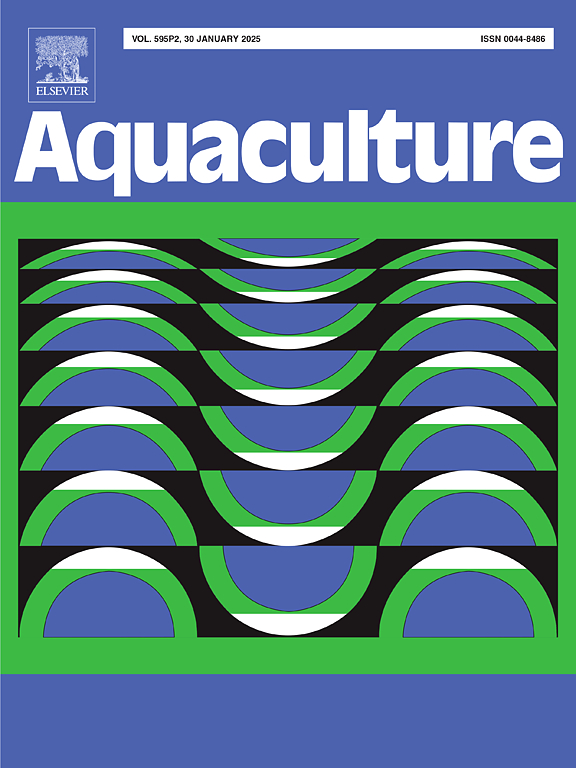Plesiomonas-mediated biotransformation of Magnolia officinalis compounds in largemouth bass (Micropterus salmoides): A microbial strategy to optimize Chinese herbal medicine efficacy
IF 3.9
1区 农林科学
Q1 FISHERIES
引用次数: 0
Abstract
Chinese herbal medicines (CHM), employed for millennia in therapeutic applications, exhibit complex chemical compositions that frequently compromise the bioavailability of their bioactive constituents. Emerging evidence underscores the pivotal role of gut microbiota in modulating CHM efficacy. Despite this progress, the specific microbial taxa responsible for these interactions—particularly in aquatic species—remain poorly characterized, hindering the development of microbiota-based aquaculture strategies. In this study, we systematically investigated key gut microbes that influence the uptake of magnolol and honokiol by largemouth bass (Micropterus salmoides). We demonstrated that: (i) antibiotic-induced depletion of gut microbiota significantly diminished serum and hepatic concentrations of magnolol and honokiol (P < 0.05), confirming microbial dependency in their pharmacokinetics; (ii) combined 16S rRNA sequencing and machine learning identified Plesiomonas, a core bacterial genus, as the dominant taxon correlated with enhanced absorption; (iii) in vitro fermentation of Magnolia officinalis crude extract with P. shigelloides M2 elevated magnolol and honokiol yields by 31.6 % and 24.4 %, respectively, compared to sterile controls; and (iv) in vivo trials confirmed that fermented extracts enhanced peak blood concentrations of magnolol (7.60 mg/L vs. 5.85 mg/L) and honokiol (2.29 mg/L vs. 1.71 mg/L) compared to non-fermented extracts. These findings demonstrate that Plesiomonas plays a central role in the biotransformation of CHM within the intestinal microbiota of aquaculture species. This discovery provides practical avenues for optimizing CHM bioavailability in aquaculture through strategic manipulation of gut microbial communities.
银杏单胞菌介导的厚朴化合物在大口黑鲈体内的生物转化:优化中草药疗效的微生物策略
中草药(CHM)在治疗应用中使用了数千年,其化学成分复杂,经常损害其生物活性成分的生物利用度。新出现的证据强调了肠道微生物群在调节中药疗效中的关键作用。尽管取得了这些进展,但负责这些相互作用的特定微生物分类群-特别是水生物种-仍然缺乏特征,阻碍了基于微生物群的水产养殖策略的发展。在这项研究中,我们系统地研究了影响大口黑鲈(Micropterus salmoides)摄取厚朴酚和厚朴酚的关键肠道微生物。我们证明:(i)抗生素诱导的肠道微生物群的消耗显著降低了厚朴酚和厚朴酚的血清和肝脏浓度(P <;0.05),证实其药代动力学中存在微生物依赖性;(ii)结合16S rRNA测序和机器学习鉴定核心细菌属Plesiomonas为优势分类单元,与吸收增强相关;(iii)与无菌对照相比,志贺氏杆菌M2体外发酵厚朴粗提物的厚朴酚和厚朴酚产量分别提高了31.6%和24.4%;(iv)体内试验证实,与非发酵提取物相比,发酵提取物提高了厚朴酚(7.60 mg/L vs. 5.85 mg/L)和厚朴酚(2.29 mg/L vs. 1.71 mg/L)的血药浓度峰值。这些结果表明,Plesiomonas在水产养殖物种肠道微生物群中CHM的生物转化中起着核心作用。这一发现为通过战略性操纵肠道微生物群落来优化水产养殖中草药的生物利用度提供了切实可行的途径。
本文章由计算机程序翻译,如有差异,请以英文原文为准。
求助全文
约1分钟内获得全文
求助全文
来源期刊

Aquaculture
农林科学-海洋与淡水生物学
CiteScore
8.60
自引率
17.80%
发文量
1246
审稿时长
56 days
期刊介绍:
Aquaculture is an international journal for the exploration, improvement and management of all freshwater and marine food resources. It publishes novel and innovative research of world-wide interest on farming of aquatic organisms, which includes finfish, mollusks, crustaceans and aquatic plants for human consumption. Research on ornamentals is not a focus of the Journal. Aquaculture only publishes papers with a clear relevance to improving aquaculture practices or a potential application.
 求助内容:
求助内容: 应助结果提醒方式:
应助结果提醒方式:


